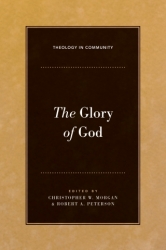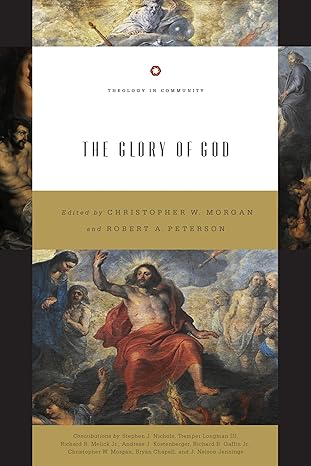Chris Morgan (dean and professor of theology at California Baptist University) and Robert Peterson (professor of systematic theology at Covenant Theological Seminary) have produced a half dozen or more titles in Crossway’s Theology in Community series. In The Glory of God they have brought together a team of theologians to examine the concept of God’s glory from a variety of biblical angles. It is one thing to talk about the glory of God, something that has become common in today’s church. But it is another thing to talk about it with precision so that our worship may be more fully informed and more worthy of the God we worship. And to this end Morgan and Peterson have done a great service.
Today we are pleased to talk to Dr. Chris Morgan about their work.
Books At a Glance (Fred Zaspel):
First, describe for us what you set out to accomplish in the Theology in Community series? What makes it unique? And what contribution were you hoping to make with it?
Chris Morgan:
We named the series as we did for two reasons.
 First, Theology in Community means we want to promote clear biblical thinking and godly responses to theological issues, both historic and contemporary. As we examine issues central to the Christian faith, we strive not only to follow a sound theological method but also to display it. Chapters addressing the Old and New Testaments on the book’s subject form the heart of each volume. Subsequent chapters synthesize the biblical teaching and link it to historical, philosophical, systematic, and pastoral concerns. Far from being mere collections of essays, the volumes are carefully crafted so that the voices of the various experts combine to proclaim a unified message.
First, Theology in Community means we want to promote clear biblical thinking and godly responses to theological issues, both historic and contemporary. As we examine issues central to the Christian faith, we strive not only to follow a sound theological method but also to display it. Chapters addressing the Old and New Testaments on the book’s subject form the heart of each volume. Subsequent chapters synthesize the biblical teaching and link it to historical, philosophical, systematic, and pastoral concerns. Far from being mere collections of essays, the volumes are carefully crafted so that the voices of the various experts combine to proclaim a unified message.
Second, Theology in Community seeks to do theology in teams. The teachings of the Bible were forged in real-life situations by leaders in God’s covenant communities. Theology was formulated by the church for the church. This series seeks to recapture that biblical reality. Scholars from many backgrounds, disciplines, and experiences with academic credentials work together. They have a high view of Scripture, robust evangelical convictions, and love grace. They are personally involved in ministry, serving as teachers, pastors, and missionaries. They stand in continuity with the historic church, care about the global church, share life together with others in local churches, and aim to write for the good of the church.
Books At a Glance:
Please tell us about the book.
Morgan & Peterson:
The Glory of God begins with Steve Nichols’ pointing to contemporary thinkers addressing God’s glory and then points to their historic roots. Then Tremper Longman examines the theme in the OT, looking at the major terms, passages and ideas. Three NT chapters follow. Richard Gaffin assesses Paul’s theology of glory, finding it linked to key truths like the gospel, the image of God, and Jesus’ resurrection. Andreas Köstenberger studies the material in John’s Gospel, epistles, and Revelation, noting some distinct ways John highlights glory. Rick Melick covers the main passages on glory in the rest of the NT, notably the synoptic gospels, Acts, and general epistles. Chris Morgan connects the dots and helps synthesize the previous truths into an overall theology of the glory of God. Bryan Chapell calls pastors to view their role in light of God’s glory, showing how they function as representatives of Christ himself. Nelson Jennings concludes with a missional theology of God’s glory, stripping away some of our western myths about glory and demarking our role in God’s glorious mission of cosmic restoration. In a nutshell, we develop a theology of the glory of God, examining it contemporarily, historically, biblically (the heart of the volume), systematically, pastorally, and missiologically.
Books At a Glance:
There in an increasing emphasis on the glory of God in many circles today, particularly the young, restless and reformed crowd. Do you see this as healthy? Are there potential problems with such an emphasis?
Morgan & Peterson:
The vocabulary of glory is on the rise, but certain misunderstandings and imbalances linger. We wonder if “the glory of God” become a cliché, much like “the love of God” to the previous generation, for whom too often love was reduced to sentimentality.
It is encouraging to hear much about God’s glory as his ultimate end. We rejoice in the renewed interested in Jonathan Edwards as well as the contemporary impact of pastors like John Piper and ministries like the Gospel Coalition. We rejoice that many are captured by God’s glory as the ultimate end, as it is the goal of creation; the Exodus; Israel; Jesus’ ministry, life, death, resurrection, and reign; our salvation; the church; the consummation; all of salvation history; and even God himself. Paul often highlights this cosmic goal: “For those whom he foreknew he also predestined to be conformed to the image of his Son, so that he might be the firstborn among many brothers” (Rom. 8:29); “all things were created through him and for him” (Col. 1:16; cf. Rom. 11:33–36; Heb. 2:10).
But while there is a healthy resurgence in teaching that glory is God’s ultimate end, many inadvertently equate God’s ultimate end with God’s comprehensive motivation (Edwards and Piper do not make this mistake but many of their fans do). As a result, it is rarely stressed that God often acts with multiple ends in mind.
Take the Exodus, for instance. Why did God redeem his people from slavery in Egypt? One might quickly reply, “For his glory.” Certainly God redeems his people from slavery to glorify himself. But the book of Exodus presents God’s reasons for deliverance in a multifaceted way:
- His concern for his oppressed people (3–4)
- His faithfulness to the covenant promises made to Abraham, Isaac, and Jacob (3:15; 4:5; 6:8; 32:13; 34:6; cf. Deut. 7:6–10)
- That Israel would serve the Lord (4:23; 6:5; etc.)
- That you should know I am the Lord (6:7; 10:2; 13:1f)
- To give the promised land (6:8)
- That the Egyptians will know I am the Lord (7:5; 14:3–4; 14:15–18)
- That Pharaoh will know the Lord as incomparable (7:17; 8:10–18)
- To display his power (9:16)
- That his name might be proclaimed in all the earth (9:16)
- To pass down a heritage to the children (10:1–2)
- That his wonders might be multiplied (11:9)
- To get glory over Pharaoh and his army (14:3–18)
- For Israel’s sake (18:8)
So God delivered his people for a variety of reasons, not merely one. The incomparable God acts out of love, holiness, goodness, faithfulness, and jealousy. This is critical to notice because if equate God’s ultimate end with God’s comprehensive motivation, we end up subsuming his attributes under his glory. But God acts according to who he is. He loves because he is loving. He acts rightly because he is righteousness. Certainly, as he acts, he displays himself; and as he displays himself, he glorifies himself. But it is problematic to say that God acts for his glory without simultaneously stressing that God acts out of his love, goodness, faithfulness—out of who he is.
Note also that God delivers his people for his glory, for their good, for judgment on Egypt, and for the continuance of his covenant people. Recognizing and stressing these multiple ends does not detract from an emphasis on God’s glory but actually underlines it. Indeed, in the Exodus, God displays his love, covenant faithfulness, jealously, providence, and power through his wonders, salvation, and judgment, in which he manifests himself and thus glorifies himself.
Or we can consider the doctrine of salvation and ask, “Why does God save us?” One might hastily retort, “For his glory.” Again, that is right and critical. But the Bible provides a wide range of reasons. That God’s motive in saving us is his love is set forth powerfully and regularly: John 3:16 states, “For God so loved the world that he gave . . .” (cf. 1 John 4:9–10). Ephesians 1:4–5 extols, “In love” God predestined us (cf. Deut. 7), and Ephesians 2:4 ties our salvation to God’s love, mercy, and grace (cf. Titus 3:4–5). John 17 records Jesus’ high priestly prayer, interweaving God’s glory and the good of his people, praying and acting in part, “for their sake” (17:19). Romans 8:28 also makes it clear that redemptive history is, in large part, for the good of God’s people.
So why does God save? For many reasons, as we noted above, but in and through all of them, God displays who he is and thus glorifies himself. God manifests his glory because in saving us he displays his wisdom (Rom. 11:33–36; 1 Cor. 1:18–31; Eph. 3:10–11), righteousness, justice (Rom. 3:25–26), love, mercy, kindness, (Eph. 2:4–7; Rom. 9:20–23), freedom, wrath, and power (Rom. 9:20–23).
Books At a Glance:
Many often ask, “If God’s ultimate purpose is to glorify himself, does that mean God is selfish?” How do you address such a question?
Morgan & Peterson:
“If God seeks his glory above all things, does this mean that he is selfish? After all, if we seek our own glory, we are deemed selfish.” The standard answer to this common question is….
Editor’s Note: We will continue our interview with Dr. Morgan here next time.

